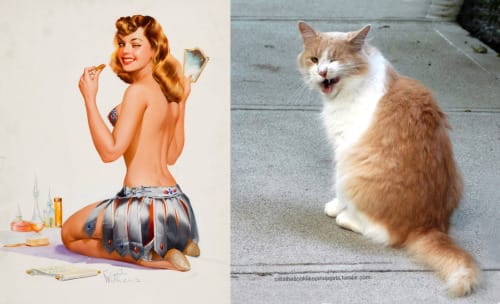How to network by developing a personal brand – without looking like a wanker
In today’s “gig economy”, most of us have little choice but to hustle. We are supposed to be “networking”, constantly marketing, building and maintaining a personal brand. Some people do it flawlessly, others shamelessly. I look at so many people doing this online and think: It must be so easy for them.
For the introverts among us, we can feel like we’re getting overlooked and left behind. In this Insight, you learn some of my best tips and tricks for self-promotion and building a strong personal brand online, without it feeling weird or insincere. My name is Katie Hinsen, you can find me on various social media, including here, on Twitter. I have talked to other familiar names in our industry about professional networking in the online age, to collect and share our wisdom. It doesn’t matter if you’re socially awkward – because you’re about to learn how to build an effective online image (that’s reinforced when you meet people in the real world).
The truth behind brand images
You might not know it, but I’m an incredibly shy person. Few people really know me, where I live or even what I do. I have nevertheless built a personal brand that is well-known in professional circles. One universal truth across all great marketing, is that there’s always the illusion and then there’s the reality. They don’t have to be the same. Any time you find yourself comparing your impostor-syndrome-riddled self to others, remember this:

Both look delicious, but they appeal to different aspects of my taste. Both are also true representations of the same hamburger.
The Internet, in all its cat-filled, troll-infested glory, is the best thing for those of us wanting to get steady work while rarely retreating from our cozy dark rooms. We can be present, social and even be networking, virtually. In terms of a personal brand, this is where we can thrive if we do it right. I have found that social media is an excellent space for professional “networking”.
The power of the internet for building your brand
This insight will reveal some of the best tips and tricks that me and some of my industry colleagues use to do this effectively.
I think in the past “branding” for individuals meant something different. But now in this social media driven one-on-one age, you’re definitely your own brand. What I mean by that is the way you conduct yourself, what you do with your time, the projects you choose, the kind of person you are: that’s your brand. That’s why I coach people into not hiding behind some cutesy company name anymore. Put your own name on your face and scream it from every roof.
I think especially in our industry this is important because people choose certain individuals to work with, not marketing packages. Of course if you do it right, you could be carefully constructing a professional persona that is so authentic nobody knows the difference.
-Kylee Peña
Defining my personal brand
My personal brand and my personal identity do overlap, but they are not the same. Choose which parts of your authentic self you would like to include in your public persona, and which additional aspects of your professional skills you would like to be best known for.
This is no different from the way we present ourselves differently in different physical spaces. I’ll wear sweatpants and be completely disorganized and let my freak flag fly at the local bar with my friends. When I’m at a professional conference or networking event, I’m in a blazer, I am pleasant and polite, and my lipstick is flawless.
The way I present myself to the industry is essentially the “about me” section of my resumé. It’s not my work history, nor my credits. Filmmaking is a team sport, and often more important than a person’s’ skills in terms of getting hired, is their fit within that team.
I decided that I wanted to be known, professionally, as a specific few things.
- An expert in post production, specifically emerging technology
- A much loved and respected member of the post community
- A wise badass with a sense of humor
If you really pay attention, most people in our industry with really strong personal brands do not rely on their credits or their resumé. Does anyone really know what Pliny does when he’s at the office? What Alexis Van Hurkman is working on lately? What Kylee Peña’s favorite NLE is? That last one is a trick question, she’s not even an Editor. But does that matter? Few editors are unfamiliar with her name.
Decide on your “personal brand” attributes, and stick to them
That “wise badass with a sense of humor” may well be a big part of who I am across all of my life. However for it to be reflected across the post community worldwide, across the Internet, it’s essential I am consistent, and a bit more specific in how I portray myself. I have professional goals I’d like to meet, and just being a wise badass isn’t quite enough.
It’s possible to be specific about your areas of expertise without making it about software, platform or your reel. Promoting yourself is about the work you want to do, and the way you want to be perceived. Unless you want to be known as a software expert – and some do – stay away from evangelizing or making too much of your profile about your past work.
Writer Jan Fortune supports this in her article about personal branding, where she warns her fellow authors to avoid becoming a commodity, by ensuring a personal brand remains authentic enough to be “personal”:
“Don’t be a brand, be yourself — be honest, be passionate, have values you are zealous about and want to share, tell the world what you do and keep your soul.”
–Jan Fortune
For me, I specifically want to be recognized for what I geek out about the most. I want to be known as an expert in emerging technology, who is generous about sharing my knowledge and encouraging others. I also choose to be known as a proud feminist and champion for diversity. Therefore I dedicate the limited interest and energy I have for social media to engaging and sharing specific types of content. It must be either about exciting new technology and science, or reflect the spirit of sharing, passing on my knowledge of the industry.
When I share content, I am careful that it is well-curated, that I have read it, and that I have something to say about it.
I can’t be a wise badass with a sense of humor if all I’m doing is recycling random articles and links. It’s better to post less content, but make it memorable and start a conversation– than share a lot of random crap that invites no engagement.
Be the person you’d want to hang out with at work
As a Hiring Manager, I always place a higher value on personality and team-fit over skills. In post production, we often spend more time at work than with our own families. Clients also want to know that the colorist they’re entrusting their project to will listen to their needs, and care about the work. The old saying about “who you know” in this industry is true, beyond the stereotype of nepotism. People are taking a huge risk hiring someone who they are unsure whether they can trust, or whether they will be a good fit in the team.
I can look up a candidate’s credits and know what they’ve worked on, easily. I can watch a reel. We can overcome nepotism more easily than ever, by becoming “known” virtually.
“Advice that’s not given enough is just how important your personal demeanor is, work ethic, friendliness, cooperativeness, the willingness to contact and meet new people outside of “business networking events”. All of that stuff is soooooo important. More important than what software or skills you have.
Time and time again I see people hired and become successful even though they weren’t necessarily the most qualified. They’re hired because people knew of them and they were liked.”
-Kira Prince
The goal of my personal branding is to ensure that I am someone who is familiar, respected and liked, without having to be in all places (or any places) physically.
There are many ideal personalities; culture-fit and likeability is not universal. That said, I recommend projecting yourself as someone you would enjoy hanging out with, as that is most likely to attract people who value the same character traits.
Being an Expert on the Internet
This is a well-known marketing strategy for individuals across all industries. It is important to do this right, to avoid appearing narcissistic. This article in Forbes by Amy Morin dives deeper into this, explaining many of the mistakes people make.
The simplest way to be seen as an expert in your field is to share your knowledge, be helpful to others (answer questions, offer advice when asked), and to always be credible and humble about it. Avoid blatant self-promotion at all costs, it causes people to resist and makes you appear less respected by the community (this is an Insight about how to build a personal brand without looking like a wanker, after all).
There are some sneaky ways around this, if you have something to share about yourself or your achievements.
You can self-promote by having or giving the appearance of a third-party promoting you, or by simply sharing something of value to the audience within a post about your own work. Of course you can always be authentic about how proud you are of what you’ve done. Just be very careful when it comes to blatant self-promotion, it can truly backfire and make your personal brand seem less credible, even when you’re celebrating an honest recognition of your expertise.
Some people write articles and blog posts sharing their expertise. Others create tutorials, and some tweet quick tips regularly. Phil Strahl, John Eremic and Jonny Elwyn do this well. Phil tweets one #ColoristTip each day.
Many people who are introverts, shy, or socially awkward struggle with this sort of commitment. It is possible to be perceived as an expert by engaging in online communities, sticking to the professional brand you have defined. If you wish to be perceived as an expert in colour grading for HDR, engage with conversations online about this topic.
Stay in your lane, keep it simple and above all, keep it credible.
Know when to step back. Sometimes saying “that’s not my area of expertise, I focus on HDR grading” is ten times more memorable, respectable and powerful a message than engaging with a topic that reveals your weaknesses, or is, in marketing speak, “off-brand”.
One weird trick…
Most of us know that the easiest way to be “liked”, is to make people talk about themselves. In real-life, this is the “trick” we’re all told will help us survive parties and networking events. This can be equally effective in virtual communities where we’re networking online.
Twitter, Facebook, LinkedIn and various industry message boards are as valid a networking space as any in today’s world. The same rules apply online as they do in real life. Much of the advice I have shared already is inline with how one might present oneself at an industry meetup.
What is sometimes forgotten with this parallel is the first rule of the art of conversation. I suppose that’s because it is less obvious when we’re not face to face:
Make people talk about themselves. Doing this in an online space means asking questions, and engaging with people more directly.
For example, offer your wisdom in the form of “do you have any questions about HDR color grading?” or “who else here has graded a TV series in HDR– what was your experience like?”. Then, as you do when you attempt to keep a conversation less awkward with a stranger, ask follow up questions. Wait to jump back in until you have something of value to add to the conversation, then step out again immediately by asking another question.
Sometimes I invite conversation by changing the wording of a post I make online, by turning a statement into an open question. I simply imagine how I might start a conversation with a stranger. I would be unlikely to approach someone in the coffee queue at NAB Show with “A.I. will have a major impact on our industry, but long-term it will be a positive one”. Instead, I could strike up a conversation with “I find A.I. fascinating, and think its long-term effects on our industry will be positive. Have you thought about it much? What do you see in our future?”
Separating professional and private public personas

My professional personal brand aims to invoke some sort of Princess Leia / Jessica Jones hybrid. My personal life looks more like Broad City meets Martha Stewart (on a farm in the South Pacific). Both are authentically me.
Just like in real life, I keep my professional and personal life relatively separate.
On the internet, I do this by assigning virtual spaces for each side of me, in the same way as I might in physical spaces. This is a common technique for most people in our industry who maintain a strong personal brand online.
When discussing professional personal branding with John Eremic (Pliny), he pointed me to this article. Michael Zimmer explains that the very notion of presenting different parts of our selves in different contexts is essential to effectively navigating the “multiple and increasingly complex spheres of our lives”. We do this authentically by highlighting and toning down different aspects of our selves depending on context.
Editor Monica Daniel told me “Twitter is public and professional sprinkled with my passions for movies and pop culture. Facebook friends are for personal things as I post silliness about my kids. I use the Facebook groups and allow people to private message me on Facebook for professional stuff.”
Others have told me that they keep their Facebook profile “curated”, using it for professional groups and to allow industry contacts to follow their work. Many colorists and DPs use Instagram as a tool for their personal brand, showing off their work, and their eye for beauty. Monica elaborates:
I do have a specific self that I present online. It is a facet of my personality. I am truthful and honest in my interactions online but the complexities of a person cannot be depicted over Social Media.
For me, Twitter and LinkedIn are strictly professional spaces. My Facebook profile is for my friends and family, I keep it exclusively for people I know in real life. However I do interact in certain professional groups with my personal brand in mind. I write blog posts that reflect and promote my professional goals, but my Instagram account makes me look like I barely use electricity. Few Instagram followers would suspect my role as an expert in the technology of the future.
We are all role-playing
Erving Goffman is a sociologist who writes at length about how we present ourselves and the roles we play. He reminds us that some of the roles we play contradict each other, and some performances are only meant for certain audience members. He calls this “impression management”. Here’s a good summary of Goffman’s book The Presentation of the Self in Everyday Life.
My personal brand is authentically me. It is essential that it is, so as to be credible. Just like in real life however, my professional self is slightly performative. We always wish to put our best selves forward in the spaces in which we network. Never be so aspirational online that you end up like a bad Tinder date should anyone meet you in real life. Simply highlight those aspects of your professional self you want to be best known for.
Putting in the work, when it feels like a lot of work
If you are naturally an introvert, maintaining an online presence and a personal brand can feel like a chore. It doesn’t have to be.
Prioritize quality over quantity of engagement online. If you aren’t much of a social media maven then pick a single space that gathers those you want to be known by. It might be Twitter, where there is a strong presence of editors and producers. Maybe you choose LinkedIn, if you are seeking to get the attention of corporate and agency types. Facebook communities like Post Chat, Blue Collar Post Collective and forums such as Lift Gamma Gain can boost your profile amongst your peers.
Make time, even as little as an hour a week, to visit and engage meaningfully in your chosen online community. Share an interesting article with your thoughts and an invitation for discussion. Answer a query, or ask a question. Some platforms allow you to schedule posts, and some people schedule them throughout the week. It is best to avoid only doing this, as engagement is the key to a positive personal brand.
You can be popular without leaving the house
Some of us don’t have the time, the energy or the inclination for traditional “networking” and hustle. If you’re like me, and live in a remote location, virtual presence is the key to being recognized at all in the wider industry.
- Define your personal brand: Keep it simple, be authentic, and portray your best self. It should be the “about me” section of your resumé, but less about your past work and more about who you are (and where you want to go) as a professional.
- Be an expert on the internet: You don’t need to write articles and create tutorials to do this. Be helpful, be humble, be credible and stay in your lane. Less is more– quality beats quantity if you have to choose.
- If you want to be likable: Remember the same rules apply online as they do in real life. Invite discussion, encourage people to engage. You can be a brand without looking like a commodity.
- Find the best virtual spaces to be present in, and take the time to engage: Keep your professional and personal lives separate online, so that your professional brand is better defined and stays on point.
In post production today, a professional online presence is more relevant and more valuable than traditional physical “networking”. In the creative industries, many of the rules of mainstream business do not apply.
It was once a widely lamented sign of industry nepotism that “who you know” matters. Fortunately today, it is possible to be well-known, well-liked and highly sought-after as a professional without having to leave the house. And you don’t have feel awkward or look like a wanker (unless that’s who you authentically are or the type of person you like working with).



